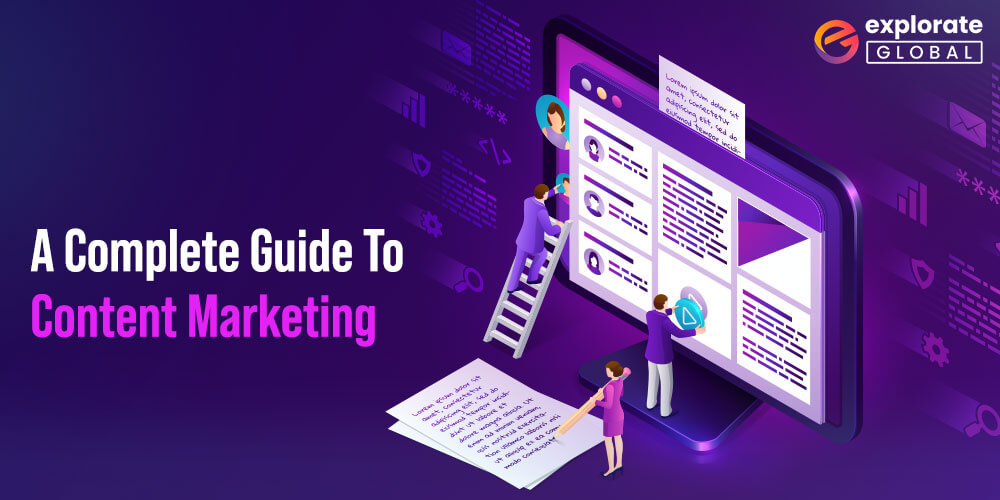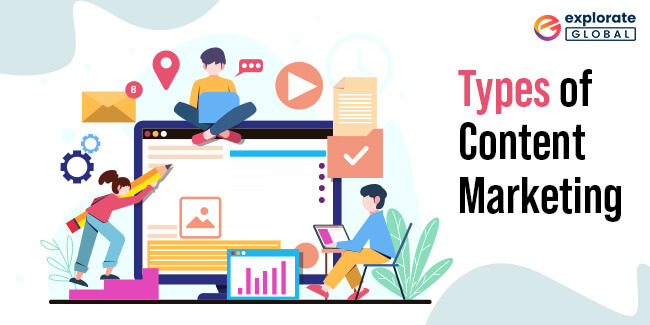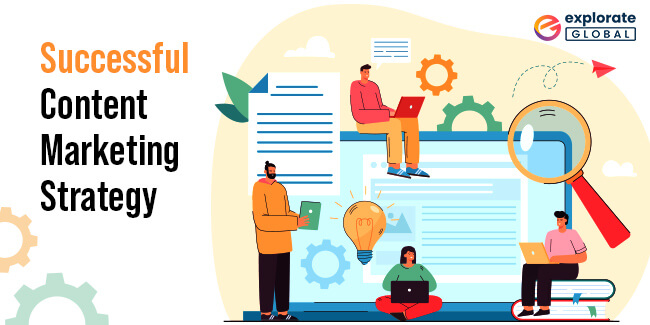
Content Marketing is a digital marketing approach to create & distribute relevant content to a targeted audience to derive an anticipated action. It focuses on developing a relationship and loyalty by offering value to its readers.
Content Marketing offers a great opportunity for businesses to boost their results. However, content marketing is not limited to content creation and distribution. It is a strategic approach that helps you to attract and engage a targeted audience and, eventually, generate profitable customer action.
Your customers, leads, and viewers want unique and SEO-friendly content from your business. Additionally, it needs to reach the targeted audience in a manner that feels natural and organic versus being disruptive. Content marketing helps businesses to achieve this, since it is a process of attracting, engaging, and delighting your target markets.
By providing valued and appropriate content to users, you can increase your online reputation, develop a community and grow supporters of your brand. Let’s get started with the basic definition, so we will get a clear idea about what we’re talking about.
What Is Content Marketing?
Content marketing means marketing your brand or business with unique and SEO-friendly content. It sounds quite simple, but there’s a lot to it. Firstly, considering the content part – That’s stuff such as blog posts, articles, podcasts, and videos. Basically, it’s information in written, audible, or visual form.
And when it comes to the marketing part. That hasn’t changed since marketing first took place in real markets. It’s all about informing your target audience about your products and services so that they turn into customers. With content marketing, you achieve this with the help of relevant content.
Unlike other types of sales and marketing strategies, content marketing makes people come to you instead of you reaching out to them. That’s why content marketing is part of inbound digital marketing. Content marketing experts create, share and distribute quality content. Quality content can be defined as content that is relevant, correct, optimized for search, and carries what your audience wants.
It is the procedure of planning, creating, distributing, sharing, and publishing content through channels like social media, blogs, websites, press releases, podcasts, apps, print publications, etc. The aim is to reach your target audience and enhance brand awareness, sales, engagement, and reliability.
Why Is Content Marketing Important?
-
- Educate your leads and prospects about the products and services you are offering.
- Boost conversions.
- Build relationships between your customers and business that give rise to improved loyalty.
- Explain to your audience how your products and services can solve their challenges.
- Build a sense of community around your brand.
Let’s take a look at the different types of content marketing.
Types of Content Marketing

There are different types of content marketing that you can integrate into your Marketing strategy. Let’s discuss some of them:
There are over 3.6 billion social media users, worldwide, so it is understandable why so many companies are investing in social media marketing. There are several platforms like Facebook, Instagram, Pinterest, LinkedIn, Snapchat to work with and numerous ways you can create and share content on each of them.
Keep Reading: Strategies to Drive Organic Traffic from Instagram
-
Infographic Content Marketing
Infographics show content, information, and data in an easy-to-understand, visual format. The combination of simple text, short statements, and clear pictures makes infographic content marketing the perfect way to effectively convey your content. They work well when trying to clarify educational or complex topics so that all users can understand them.
-
Blog Content Marketing
Blogs are influential inbound content that enables creativity in purpose and subject matter. With the help of blog content marketing, you can do things like promoting other internal and external content and blog articles through links, add social share buttons, and integrate product information.
Also read about: Blog Conversion Rate Optimization
-
Podcast Content Marketing
According to a 2020 survey, 49% of Americans between 12 and 32 years had listened to a podcast within the last month, with an average of six listening hours a week. Because of this, many companies and media have started to create and share their own podcasts.
Podcasts are very creative because they can cover any topic you choose. Furthermore, you determine other elements associated with the podcast such as cadence of episodes, who’s on the podcast, where you promote the podcast, and how long episodes are.
-
Video Content Marketing
According to a study by Wyzowl, 69% of consumers prefer videos to learn about brand products or services. In addition, video content marketing can increase conversion rates, boost return on investment, and help you build relationships with users. You can share your video content on social media platforms, landing pages, or retailer websites.
-
Paid Ad Content Marketing
Paid ad content marketing can help you reach a huge customer base and let you position yourself in all of the places you want to be seen. Paid ads are very beneficial when combined with inbound marketing. You can share paid advertising in many places, including social media, banners, landing pages, and sponsored content.
What is a Successful Content Marketing Strategy?

Content marketing strategy includes the planning, creation, distribution, and evaluation of the performance of content developed to either create awareness or generate leads for your brand or business. So, how to create an effective content marketing strategy? Build a proper plan. Create your content. Publish, evaluate, improve, repeat.
Seems quite straightforward right? But this is only the basic aspect of content marketing. It’s just the planning, not a content strategy and it’s missing out on the impact perspective of a focused goal, personalized, purposeful approach to your brand’s content.
It’s one thing to have an attractive, educational lineup of blog posts, video content, Infographics, white papers, and social media content. It’s a whole new process to make all these pieces come together and take on a life of their own, that can influence your marketing goals and drive business growth in the long term.
Once you start up with content marketing and finding your pace, you want to up the complexity level of your marketing strategy to acquire more of an impact. Use these principles, the 3 P’s of successful content marketing.
-
Priorities
To reach the right target at the correct time with the appropriate content, you must recognize what’s driving your content marketing strategy. Describe your strategy’s driving force, aiming at one or two priorities. Certainly, every business needs their content marketing to boost website traffic organically, generate quality leads, increase brand awareness, expand customer loyalty, and every other marketing goal you want to achieve.
The predictable mindset with this approach is to create unique and SEO-friendly content and then achieve a little bit of everything accordingly. You may get some of your KPIs to achieve their targets, but the actual and viable impact isn’t there. Through effective content strategy, it’s the priority goals that drive relevant traffic.
So, what should be the priorities that you need to focus on? Don’t seek the priorities that will produce the most striking content marketing ROI numbers, but instead look for the ones that are associated with business goals. Of course, all points along with the buyer’s journey matter all along, but which part you need to improve on is the most important right now based on business requirements.
You need to find out where your organization is struggling. For example:
-
- New service or other modification you want your customers to know about? Generate web traffic and stir up your social media platforms.
- A growth plateau? Then focus on acquiring high-quality leads.
- Limited market reach? Then aim for brand awareness and leadership.
- Overwhelmed by small engagement numbers? How is your content functioning to expand the customer experience?
- Not getting business recurrence or is your brand support limited to an army of one? Your strategy should focus on customer dependability and retention.
When you focus on one segment of the buyer’s journey, you aren’t ignoring the rest. What you’re doing is laying the foundation for the other priorities. And, when you come around to the starting of the funnel again or when you modify your content strategy to focus on one stage to the next, you’re already set up to make an even more successful strategy because your business has more content marketing experience and resources.
-
- High-quality content creation
- More refined use of technology
- Better informed metrics
And, more confidence and administrative support to drive boundaries and be a content marketing leader in your industry.
Learn About SEO tips to boost ranking
-
Personalization
Content marketers need to think about personalization when creating their strategy. Personalized email provides content sequencing, product recommendations, landing pages, and other types of personalized content that customers expect today. In 2015, Gartner predicted that companies who have invested heavily in personalization would overtake their competitors who lack personalization by 20%.
With the help of the right content automation platforms, marketers are utilizing machine learning and predictive analytics to modify content for both individuals and buyer sections, which builds a better experience. The truth is, customers are more likely to leave and write your brand off in their minds if they are exposed to one or two pieces of content that are not appropriate to them.
With a huge amount of content out there today, what really matters to them will only get any attention. In one of the Marketing Insider Group and OneSpot surveys, 45% of consumers won’t hang around with a brand that is not relevant to their interests. 42% are less interested in a product or service if the brand’s content isn’t relevant.
Add personalization to your content marketing strategy. This means exploring your marketing techniques to ensure you are capable of providing better-personalized content. It also means taking time to understand customer requirements through both customer data and feedback.
-
Purpose
And the final P for a successful content strategy – Purpose. Why does your brand exist and What is the main purpose of your business?
You need to achieve this ultimate goal in all content.
-
- What is the purpose of your business?
- How is it impacting society?
- What are the values and standards of your brand?
- How does your product or service improve the lives of customers?
- How does your business idea differentiate you from your competitors?
- And – where is it leading? What role will your company play in the future society?
What is the core belief that drives your business? It’s there if you don’t know it already. You may have to work hard to obtain it and do some structural soul searching. But your customers are not only inspired by communication, they also want to be a part of them. And that’s an effective content marketing strategy.
How Much Budget Does Content Marketing Need?
You understand your content marketing strategy will surely impact your marketing objectives and business outcome. But, how much budget do you need to ensure your content marketing is effective enough?
There are two outlooks when it comes to the content budget: Invest more and achieve more – The more encrusted, the better supported by technology, and the more skill you have going into your content creation, the better will be the potential impact.
Content marketing can be extremely economical so utilize that advantage. One of the powers of content is its capability to provide cost-effective results. The cost of content marketing is 62% lower than that of outbound marketing (as per the CMI) but it generates three times the number of potential customers. It also helps increase the conversion rate, which is six times higher than other marketing approaches.
Both budget views are correct. With a great budget, you can invest in better technology to make your content marketing strategy more effective. You can still use the best content strategies such as influence marketing and experiential marketing to get rewards. But many things can be done with a smaller budget, such as small startups.
When you have the budget to step further than blogs, social media, and explainer videos, you can start moving into building a multi-dimensional brand that your viewers can not just buy from, but also become a part of. Not only does it provide data about traffic and potential customer generation, but it also provides reliability indicators.
If you start with a large budget but still don’t know how to use your content marketing budget effectively, you may waste a portion of your budget. For B2B marketers, on average 70% of content has never been used. To understand how much is enough, think of your content budget as a constantly changing number.
Even if your budget this year is small, it does not mean that you cannot increase it by 10%, 20%, or more next year. This provides you the flexibility to have what you want but also to avoid wasting your budget just because your business doesn’t yet have enough experience with content marketing. What it can do, and what channels and strategies make the most sense for your business.
FAQ’s
Where Do I Start With Content Marketing?
A good starting point for any kind of online marketing, including content marketing, is to recognize your targeted audience. If you know who you’re trying to reach, that makes it easier to decide the type of content, the publishing and sharing platforms, and measuring content marketing ROI.
Once you identify your audience, you can start by creating and sharing content. A common starting point for content marketing is creating a relevant blog.
How Does Content Marketing Build Your Business?
Nowadays, consumers mostly do their own research. Using content marketing provides you something they can find when they search. Content brings you traffic, educates your customers, and provides leads and sales.
What Are The Recent Trends In Content Marketing?
Content marketing is always changing. The most recent trends in content production consist of using video and live video and creating more interactive and communicating content, such as polls and quizzes.
The Bottom Line
Content is the basis of every kind of online customer interaction. From search and discovery through consideration and on to conversion, content helps users to make decisions. Content marketing helps businesses take full advantage of their return on investment in content by confirming each content asset.
Whether it’s a blog post, email, article, infographic, video, or any other format, it should reach the most interested and relevant audience. As the world gets noisier, more brands will consider content marketing to differentiate their brand from the crowd.
If you are a startup or a brand that is just in a starting phase you can consult a reputed Content Marketing agency like Explorate Global which can help you with content marketing services or scaling content marketing efforts to become an established brand.



Very nice article. I really enjoyed reading this post.